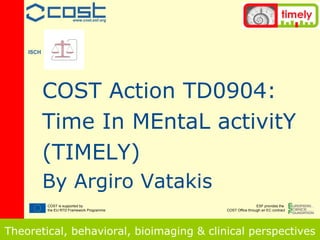General Overview of TIMELY
- 1. COST Action TD0904: Time In MEntaL activitY (TIMELY) By Argiro Vatakis Theoretical, behavioral, bioimaging & clinical perspectives COST is supported by the EU RTD Framework Programme www.cost.esf.org ESF provides the COST Office through an EC contract ISCH
- 2. Georgios Papadelis Time In MEntaL activitY Main objectives To create the first multidisciplinary network on Time Perception (TP) To advance the understanding of the processes underlying TP by exploring the relevant theoretical, behavioral, neurobiological and clinical perspectives
- 3. Georgios Papadelis Time In MEntaL activitY Scientific work plan
- 4. Georgios Papadelis Time In MEntaL activitY Defining & measuring time The operational definition of time If there is no âcommon languageâ then what are we measuring? Types and reliability of existing measurement methodologies
- 5. Georgios Papadelis Time In MEntaL activitY Defining & measuring time
- 6. Georgios Papadelis Time In MEntaL activitY Defining & measuring time Expected outcomes: Conceptual analysis of time & review of the operational definitions of the various aspects of TP for a common-interdisciplinary grounding of the concept of time Existing methodologies used for measuring TP & new models for TP measurement Tools for the assessment of timing performance in adults & children Online source for measurement standards & data exchange Time standards in user interface design in HCI application domains
- 7. Georgios Papadelis Time In MEntaL activitY Defining & measuring time
- 8. Georgios Papadelis Time In MEntaL activitY Variability in TP TP is characterized by great inter- and intra-participant variability. Why? What is the developmental time course of TP? The representations of time as defined by culture, language, and gesture
- 9. Georgios Papadelis Time In MEntaL activitY Variability in TP
- 10. Georgios Papadelis Time In MEntaL activitY Variability in TP Expected outcomes: Biological/cognitive factors promoting TP differences within & across individuals Comparing TP developmentally Time metaphors in language/gesture cross-culturally Static vs. dynamic ideas of time based on temporal logic TP questionnaires for cross-cultural comparisons & other large epidemiological studies Linguistic database with multicultural time expressions Knowledge-based system able to recognize temporal expressions
- 11. Georgios Papadelis Time In MEntaL activitY Variability in TP
- 12. Georgios Papadelis Time In MEntaL activitY Extending to complex stimuli Large body of investigations of TP using low-informational content stimuli How can we extend TP to practical applications without the use of complex stimuli/events?
- 13. Georgios Papadelis Time In MEntaL activitY Extending to complex stimuli
- 14. Georgios Papadelis Time In MEntaL activitY Extending to complex stimuli Expected outcomes: Analysis & review of the problems associated with complex stimulus use in TP Standardized methodology/analysis for measuring TP for complex stimuli Strategies for using current/future results for the development of real-world applications Standardized methodology for generating complex stimuli & system requirements for time-controlled stimulus presentation Stimulus database
- 15. Georgios Papadelis Time In MEntaL activitY Extending to complex stimuli
- 16. Georgios Papadelis Time In MEntaL activitY Neural correlates of TP Further investigation of the specific human and animal brain structures involved in the perception of time Technologies and methodologies for identifying structures involved in TP The role of TP in various disorders and impairments
- 17. Georgios Papadelis Time In MEntaL activitY Neural correlates of TP
- 18. Georgios Papadelis Time In MEntaL activitY Neural correlates of TP Expected outcomes: Current state-of-the-art in neuroimaging & definition of the techniques (or fusion) appropriate for TP Links between TP & well-known neural networks underlying attention, memory, language, space perception and action Time distortions in various mental & developmental disorders & specific brain-injuries Neurorehabilitation techniques & standardized TP tasks for inclusion in diagnostic neuropsychological batteries
- 19. Georgios Papadelis Time In MEntaL activitY Neural correlates of TP
- 20. Georgios Papadelis Time In MEntaL activitY The consortium Senior and junior scientists from:
- 21. Georgios Papadelis Time In MEntaL activitY The consortium Gender balance Open-network throughout projectâs duration
- 22. Georgios Papadelis Time In MEntaL activitY 4-year time plan
























